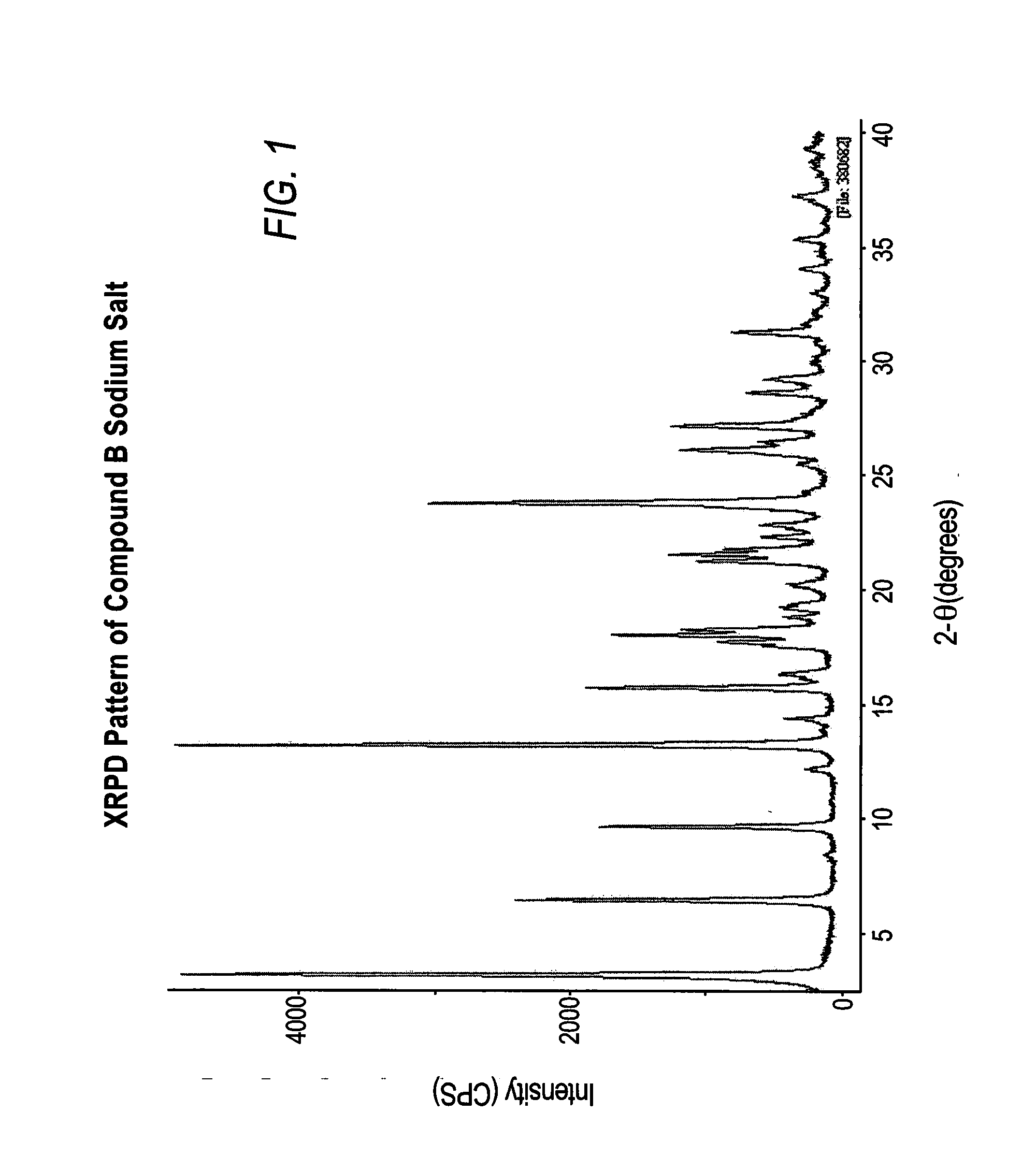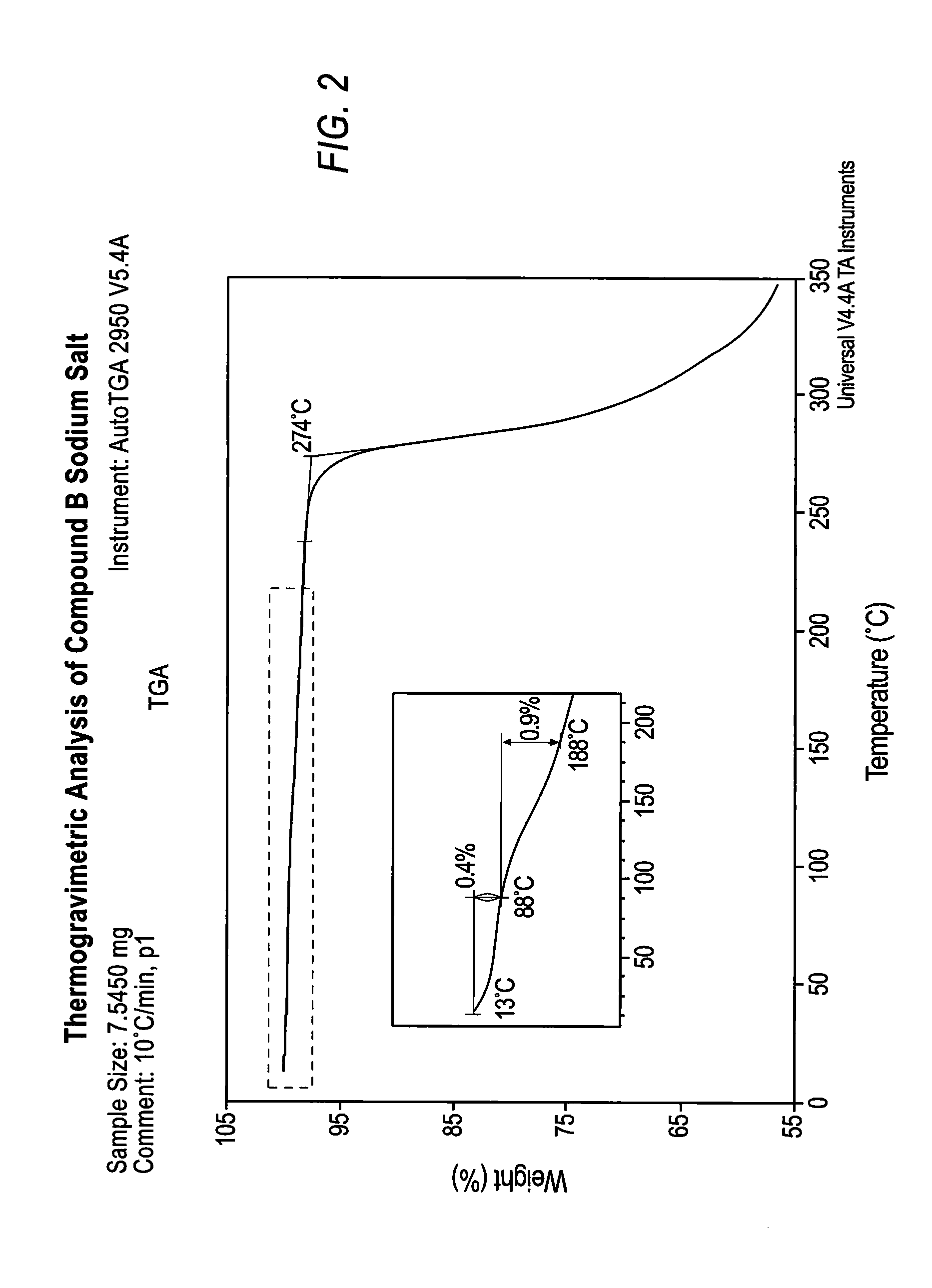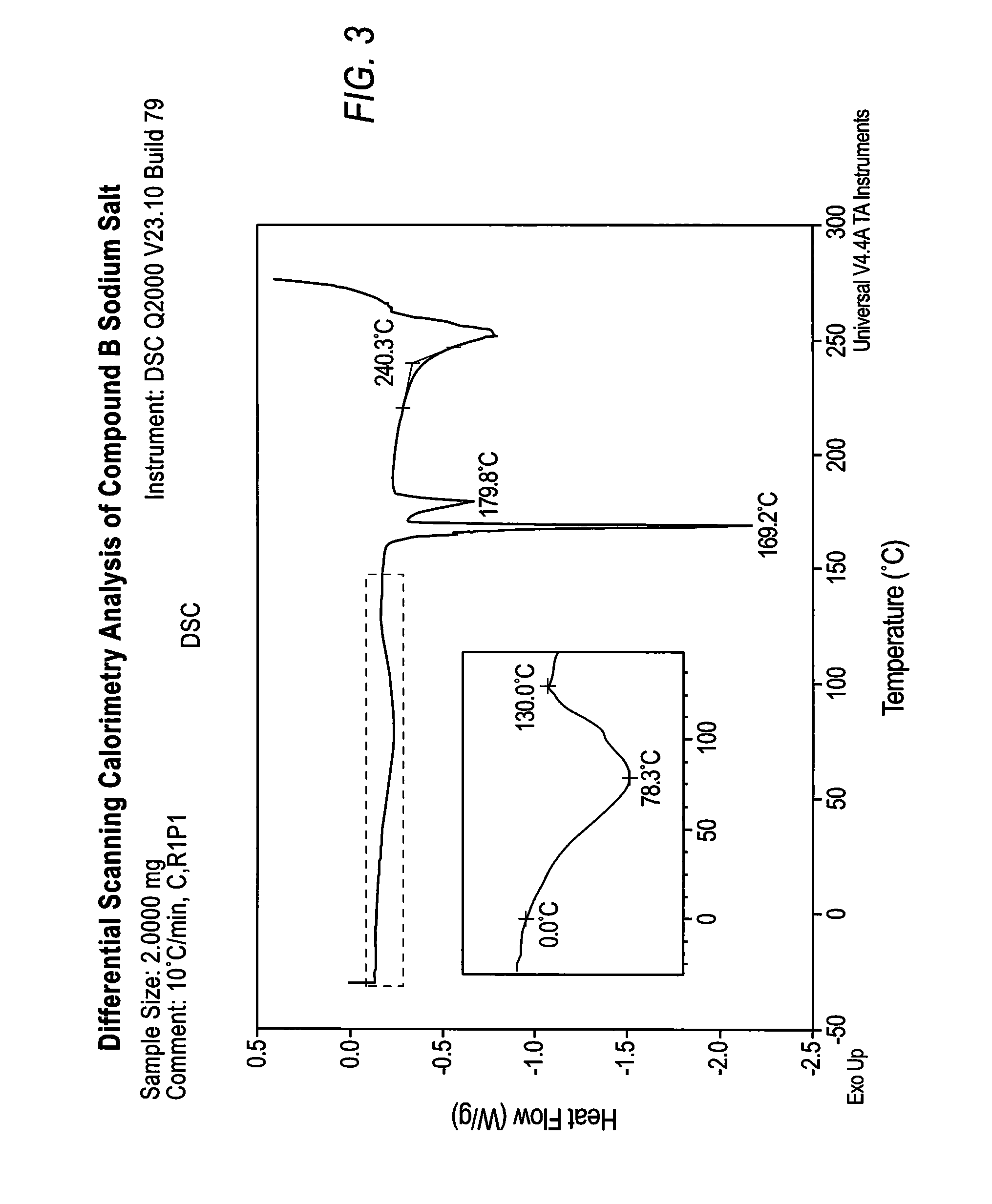Ppar-sparing thiazolidinedione salts for the treatment of metabolic diseases
a technology of thiazolidinedione and salt, applied in the field of salt of thiazolidinedione, can solve the problems of sodium reabsorption and other unpleasant side effects, and achieve the effects of not augmenting sodium re-absorption, reducing binding and and reducing binding or activation of nuclear transcription factors ppar and ppar
- Summary
- Abstract
- Description
- Claims
- Application Information
AI Technical Summary
Benefits of technology
Problems solved by technology
Method used
Image
Examples
example 1
5-[4-(2-oxo-2-phenylethoxy)benzyl]-1,3-thiazolidine-2,4-dione
[0283]
Step 1. Preparation of 4-(2-hydroxy-2-phenylethoxy)benzaldehyde
[0284]To 2-(4-fluorophenyl)oxirane (6.50 g, 54.0 mmol) was added toluene (85 mL), 4-hydroxybenzaldehyde (9.89 g, 81.0 mmol), PEG4000 (polyethylene glycol, 1.15 g) and 1M NaOH (85 mL) and the stirring mixture was heated at 78° C. overnight. After cooling to RT the reaction mixture was extracted with EtOAc, and the organic phase was washed with brine, dried (Na2SO4), filtered and evaporated in vacuo. The resulting yellow oil was chromatographed on a medium silica gel column eluting with 0-10% EtOAc / DCM. Fractions containing predominantly the higher Rf spot were combined and evaporated in vacuo to give 10.85 g (14%) of the title compound as a yellow oil. Fractions containing predominantly the lower Rf spot were combined and evaporated in vacuo to give 0.64 g of the regioisomer as a colorless, viscous oil. Mixed fractions were combined and rechromatographed e...
example 2
Preparation of 5-{4-[2-(4-fluorophenyl)-2-oxoethoxy]benzyl}-1,3-thiazolidine-2,4-dione
[0288]
Step 1: Preparation of 4-[2-(fluorophenyl)-2-hydroxyethoxy]benzaldehyde
[0289]To a stirring solution of 2-(4-fluorophenyl)oxirane (5.60 g, 40.0 mmol) in toluene (65 mL) was added 4-hydroxybenzaldehyde (7.40 g, 61.0 mmol), 1M NaOH (65 mL) and PEG4000 (polyethylene glycol, 0.85 g) and the reaction was heated at 78° C. overnight. After cooling to RT, the reaction was extracted with EtOAc (2×150 mL) and the combined extracts were washed with brine, dried (Na2SO4), filtered and evaporated in vacuo. The resulting light brown oil was chromatographed on silica gel eluting with 30-40% EtOAc / hexanes. Fractions containing the higher Rf spot were combined and evaporated in vacuo to give 2.38 g of the regioisomer of the product as a white solid. Fractions containing the lower Rf spot were combined and evaporated in vacuo to give 1.54 g (22%) of the title compound as a colorless viscous oil.
Step 2: Preparat...
example 3
Preparation of 5-{4-[2-(2-fluorophenyl)-2-oxoethoxy]benzyl}-1,3-thiazolidine-2,4-dione
[0293]
Step 1: Preparation of 2-(2-fluorophenyl)oxirane
[0294]To a solution of o-fluorostyrene (5.0 g, 41.0 mmol) and acetic acid (2.33 mL, 40.9 mmol) in dioxane (33 mL) and H2O (78 mL) at 0° C. was added N-bromosuccinimide (8.02 g, 45.0 mol) in three portions. The reaction was allowed to warm to RT and stirred overnight. Sodium carbonate (8.68 g, 81.9 mmol) was added in portions and then 1M NaOH (ca. 10 mL) was added and the reaction was stirred at RT overnight. The reaction mixture was partitioned between water and EtOAc, and the aqueous phase was extracted with EtOAc. The combined organic phases washed with brine, dried (Na2SO4), filtered and evaporated in vacuo to give 5.31 g (94%) of the title compound as a slightly tinted oil which was used without further purification. MS (ESI+) for C8H7FO m / z 138.1 (M+H)+.
Step 2: Preparation of 4-[2-(2-fluorophenyl)-2-hydroxyethoxy]benzaldehyde
[0295]To a stir...
PUM
| Property | Measurement | Unit |
|---|---|---|
| Volume | aaaaa | aaaaa |
| Length | aaaaa | aaaaa |
| Length | aaaaa | aaaaa |
Abstract
Description
Claims
Application Information
 Login to View More
Login to View More - R&D
- Intellectual Property
- Life Sciences
- Materials
- Tech Scout
- Unparalleled Data Quality
- Higher Quality Content
- 60% Fewer Hallucinations
Browse by: Latest US Patents, China's latest patents, Technical Efficacy Thesaurus, Application Domain, Technology Topic, Popular Technical Reports.
© 2025 PatSnap. All rights reserved.Legal|Privacy policy|Modern Slavery Act Transparency Statement|Sitemap|About US| Contact US: help@patsnap.com



